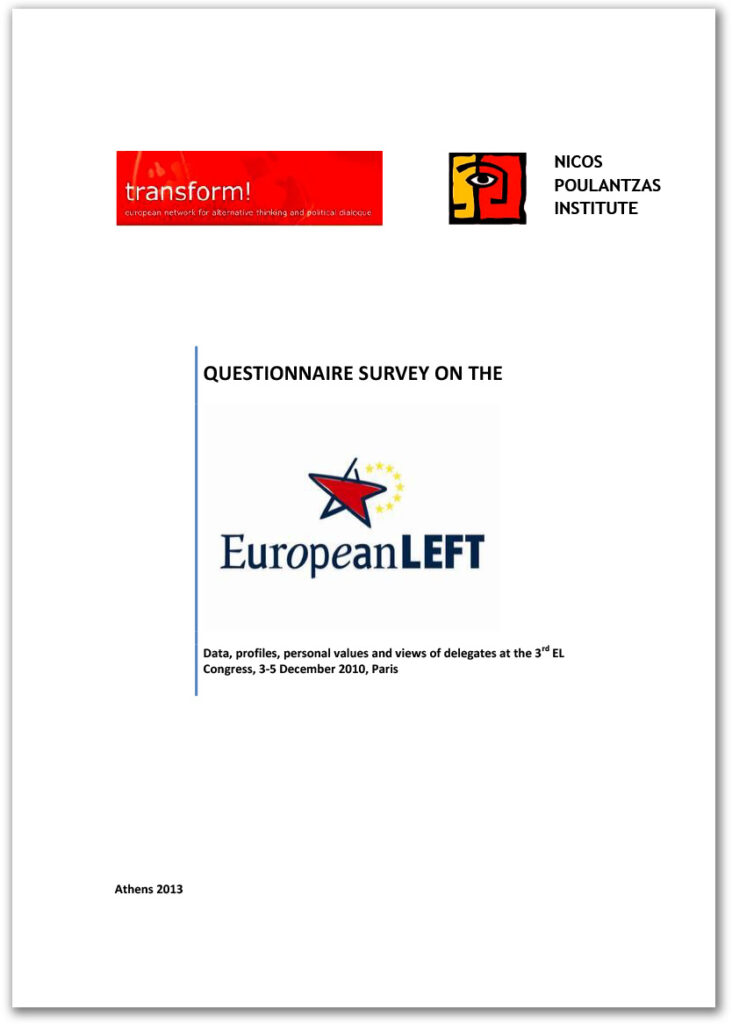The survey was conducted by transform! europe and Nicos Poulantzas Institute during the 3rd Congress of the Party of the European Left, held in Paris on 3-5 December 2010. It is based on the answers given to a questionnaire by the delegates of the Congress.
This survey is a product of the on-going, since 2009, “Left Strategy”-project of transform! europe, dealing with issues that can be useful to the parties of the so called “radical” or “transformative” Left, as well as to the EL, in the setting of their policies.
The EL itself has conducted a similar Survey in the past, which was based on a questionnaire answered by the delegates of its 2nd Congress, held in Prague on 23-25 November 2007. The present transform! / NPI Survey is the first extended exercise of this kind, which will have a follow-up so that one can have meaningful comparisons of the respective results.
The text is divided in four sections:
A. Profile of the delegates
B. Values of the delegates
C. Views of the values of the delegates on various issues
D. Evaluation of the Party of the European Left by the delegates
The technical specifications of the survey (sampling method, sample size, regional classification of the delegates’ parties, Questionnaire) are included in the appendix. The answers to the questionnaire were classified by sex, age and region. On some issues this classification revealed significant differences in the delegates’ answers. Regional differences were more distinct, especially regarding the answers of delegates representing parties from Eastern Europe.
Please find the full survey (pdf) on the right.
Brief Summary
A. Profile of the delegates
Delegates in the 3rd EL Congress are on average over 45 years of age, university graduates and frequent internet users (who, however, rarely or never visit the EL website and portal), they can communicate mainly in English and are high ranking cadres of their parties in which they are active for more than 10 years. They have (or had in the past) a very high rate of participation in trade-unions but not in social movements, with the exception of student/youth organizations. They are wage earners with an income highly differentiated in regional terms: the overwhelming majority of delegates form parties of Eastern Europe earn less than 20.000 Euro per year, while the opposite is the case with delegates from Southern and Northern Europe. Western European delegates are clustered equally around the 20.000 euro annual income.
An interesting finding in this section is that most married delegates with children are men, one more evidence of the problems faced by women involved in politics. In this respect, the EL should be praised for following the gender equality principle both for the delegates of the Congress and the members of its Executive Board.
B. Values of delegates
While the body of the Congress sees immigrants in a positive way, this is not the case for Eastern European delegates. Delegates do not generally accept violence as a legitimate means in social and political struggle, but here again there is an exception with the younger among them (18-24 years having) the opposite view. Finally the vast majority of delegates adopt the so called “libertarian” values on certain issues (legalization of the consumption of cannabis and same sex marriages, the women’s right to abortion) and they are not religious.
C. Views of delegates on various issues
Delegates are pessimist regarding the exit from the crisis, but don’t believe that this has influenced their parties’ attitude towards the EU. They see social movements as a friendly force and the vast majority of them, with the exception of Eastern Europeans, believe that they have significantly influenced their national parties. They consider themselves more “left-wing” than their parties, which according to their view are to the left of the Party of the European Left. Eastern delegates diverge from this general rule placing the EL to the left of their parties.
Delegates are not satisfied with the way democracy functions in their countries, with dissatisfaction in the 18-24 years age group reaching 100%. The same applies to the EU, but to a lesser degree, especially in the case of young and the Eastern European delegates. The Congress body believes that the EU has generally harmed their countries, with Eastern European delegates having exactly the opposite view.
D. Evaluation of the Party of the European Left by delegates
The majority views in the Congress body regarding the EL discourse is that it is “anticapitalist”, “alternative” and “transformative”. Delegates believe that the EL has a clear policy on most policy issues, but a closer inspection of the answers shows significant lack of information regarding these policies. The same is true with party bodies, where general positive answers are accompanied by a high percentage of “don’t know” responses. The body of the 3rd EL Congress does not think that the EL has a significant impact on their national parties or on the EU policies. Here also the opinion of delegates from Eastern Europe is different. Delegates view is that the EL should concentrate mainly on the issues of crisis, unemployment, environment, social welfare and immigration. Finally, most delegates prefer more a “looser” than a “stricter” EL structure with those coming from parties of Eastern Europe divided in two.
